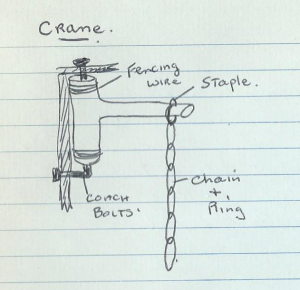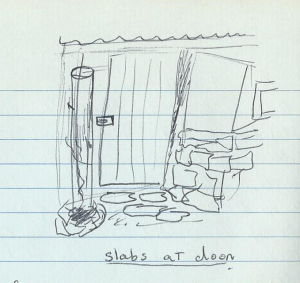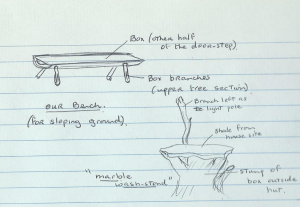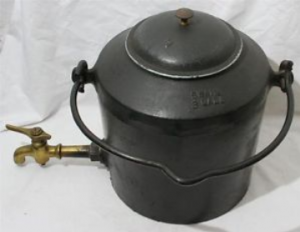During this period, we built up an outside surround of shale up to the top of the stove level on the chimney surround. This not only prevented more blistered hands, but improved heating of the oven (both bread and scones were baked). The fountain had been left full of water, which

The crane we made to suspend the fountain and move it to one side on the stove top. This allowed us to use the whole stove if we needed it to, and take the fountain off the boil if we had a raging fire.
after a week, was rusty. It was emptied, refilled, and again put into use as a hot water supply. One “light work afternoon” resulted in a new crane for it, made from found objects of a tree we had cut the day before and a piece of chain from a dingo trap found on our southern boundary, all held securely by two rusty coach bolts from the bottom of the trailer. The fountain can now be moved aside at night, or when the whole top of the stove is required for cooking. To prevent rusting the top of the stove was liberally buttered a couple of times.
As well as the kerosene wall sconce which we took with us last time we had electric lighting, run from Elsie’s spare battery.
Shale was selected and split and laid on a bed of gravel from the dry wash to form a temporary floor. It was better than dirt but definitely needs re-laying and concreting.

The door of the hut showing shale ‘doorstep’ and the post with jasmine
Water was collected by family excursions to the creek with five gallon jerry cans and the Fountain or by individual excursions of child plus bucket. The chinking of all walls was finished by Miriam and Joseph. Filler logs are beginning to sink against each other (they still have bark) leaving a gap at the top of each section. An extra 6″ x 1 & 1/2″ board was nailed to the outside of the log walls to close this gap at the outside, while still allowing ventilation.

The bench we made with variable leg lengths so it sat on the slope with the seat horizontal. The other half of this grey box trunk formed the threshhold, at the doorway. And the ‘marble washstand’, what a beauty! If we were at Melemijo there was a towel hanging off one of the twigs on the upright.
To prevent too much damage from wet feet, a few slabs of shale were put outside the door (no spouting as yet) to allow water to drain away around them. A piece of jasmine planted beside the original post appeared to be dying. This is been surrounded by a shale garden bed edge and the front of the heart cleared and covered with raked gravel.
A shutter of 6 inch by one and a half inch planks was made and attached over the window, which we discovered unsecured – either strong winds or prying fingers.
The [camping] trailer was opened out fully and used as a bedroom by the children. A box tree close to the hut was felled, except for one slender branch which was used to carry the electric light wire from Elsie to the heart. With a large slab of shale from the house site the stump became a “marble washstand”.
A note about the ‘fountain’:

An example of a fountain like the one described in this post.
[added by Miriam]
A ‘fountain’ in this context is not a garden feature, but a cast iron urn that sits on a stove top and acts like a hot water services. Here’s a pic I found on the web. I don’t know why they are called fountains, but they are. And if you search for ‘cast iron urns’ on the interwebs you get decorative items – some of which I suspect are intended as receptacles for the ashes of deceased persons … The example here happens to be enamelled (I saw a picture of it with the lid off) but ours was not – hence the issue with rusting.

